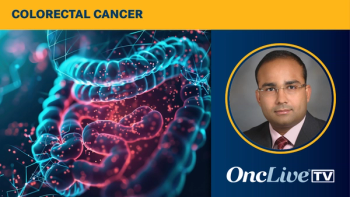
Refinement of Techniques and the Future of mCRC
Transcript: John L. Marshall, MD: All right. A couple of questions that have come in while we were talking, so we’ll kind of address those in order. So, repeat biopsies. You know you do it in breast, you do it in lung, should we be doing it in colon? If you’ve done the profile on the primary, is it worth it maybe downstream to do it on the MET [metastasis]? I’m arguing yes, that I often repeat profiling.
Tanios S. Bekaii-Saab, MD: I think it’s reasonable. Then you think about things change on a year-to-year basis and certainly some of these panels expand, more targets. But there’s also better refinement of techniques and all this. So for that alone I think it may be reasonable, especially when it triggers a decision point. The other is, there is some level of discordance between primary and ... even if it’s 20% or 10%.
John L. Marshall, MD: Well, I have now 2 cases where the opposite that was not supposed to happen did, where the primary was in fact mutated and the METS were wild-type, and the patient did systemically respond.
Tanios S. Bekaii-Saab, MD: So you can take care of the primary surgically and the rest systemically.
John L. Marshall, MD: Yeah. Which we always think that’s not supposed to happen, but some clone made it out that did.
Tanios S. Bekaii-Saab, MD: Well it does; it’s being reported. I think it’s reasonable to consider that. Now here’s the challenge though. How many tumors can you go after? And this is where….
John L. Marshall, MD: Yes. And even within 1 tumor you get different profiles.
Tanios S. Bekaii-Saab, MD: Yes, depending where you put that needle. This is where I think if we get to a better liquid biopsy in the future, we’re going to have a much better snapshot about what’s going on in the cancer. We’re not completely there today, but we will get there.
John L. Marshall, MD: Is MSR deficient the same as MSI [microsatellite instability]? I Mean, is that 1 thing—if I’ve got immunohistochemistry [IHC], do I also need Next Gen [next-generation sequencing]? Do I need tumor mutational burden [TMB]? If you just had IHC are you done, or do send the Next Gen as well?
Tanios S. Bekaii-Saab, MD: No, no, no. I still send the Next Gen, and part of it has to do with the fact that there are some non—MSI-high patients who would have a very high tumor mutation burden. They may have other mutations, but there are some unexplained reasons for that. And high tumor mutation burden I think is a much better predictor at the end of the day of response versus MSI-high on its own. So I think MSI-high is just a surrogate. I mean MSI-high is important because it essentially leads us down the path of possible Lynch [syndrome] for some.
John L. Marshall, MD: Well, then I’m doing it sort of confirmatory. So if I’ve got just the IHC on biopsy, I am I’m sending it. So that makes me reassured that, yes, that was right, and it’s correlating, and I’m back to the TMB analysis. You can also, there is a poor man’s way of looking at the Next Gen analysis to see whether this might be germline. But the reality is I send them before that no matter what, no matter what I’m seeing.
John L. Marshall, MD: This has been great. Thank you very much for the discussion, Tony, and we hope that you out there found this information that we talked about to be valuable to your clinical practice. Look, we thank you for watching this OncLive News Network® and spending your time with us today.
Transcript Edited for Clarity



































